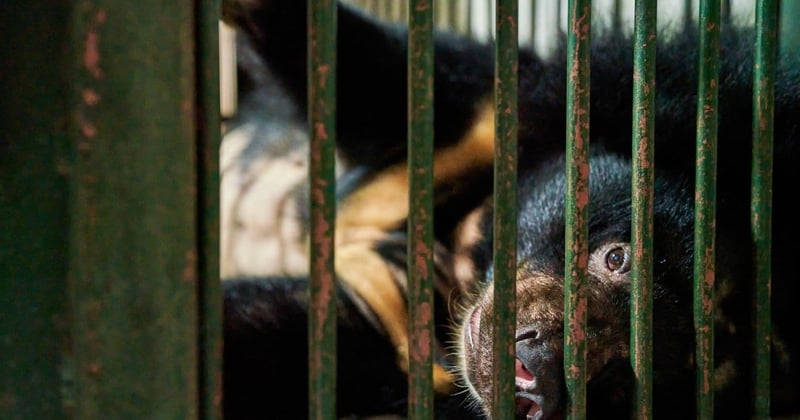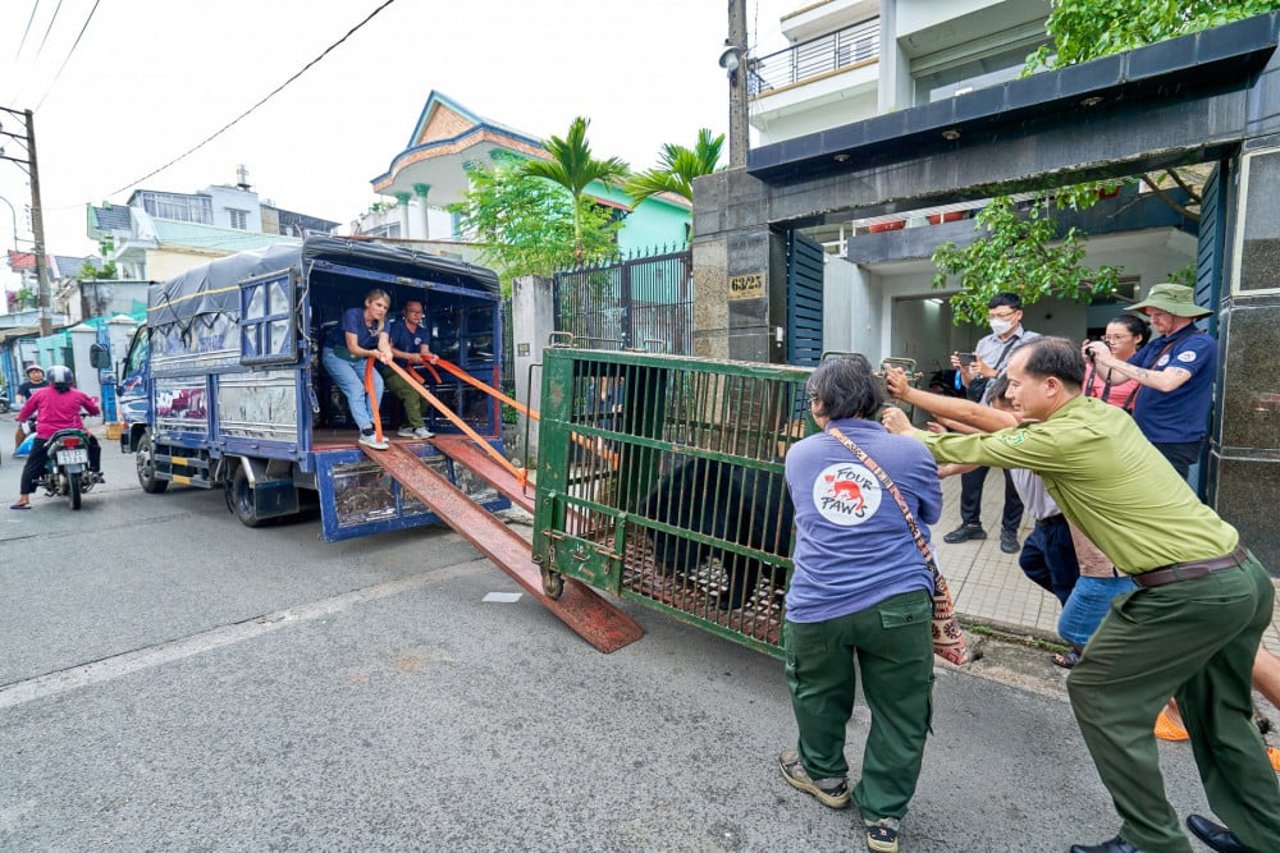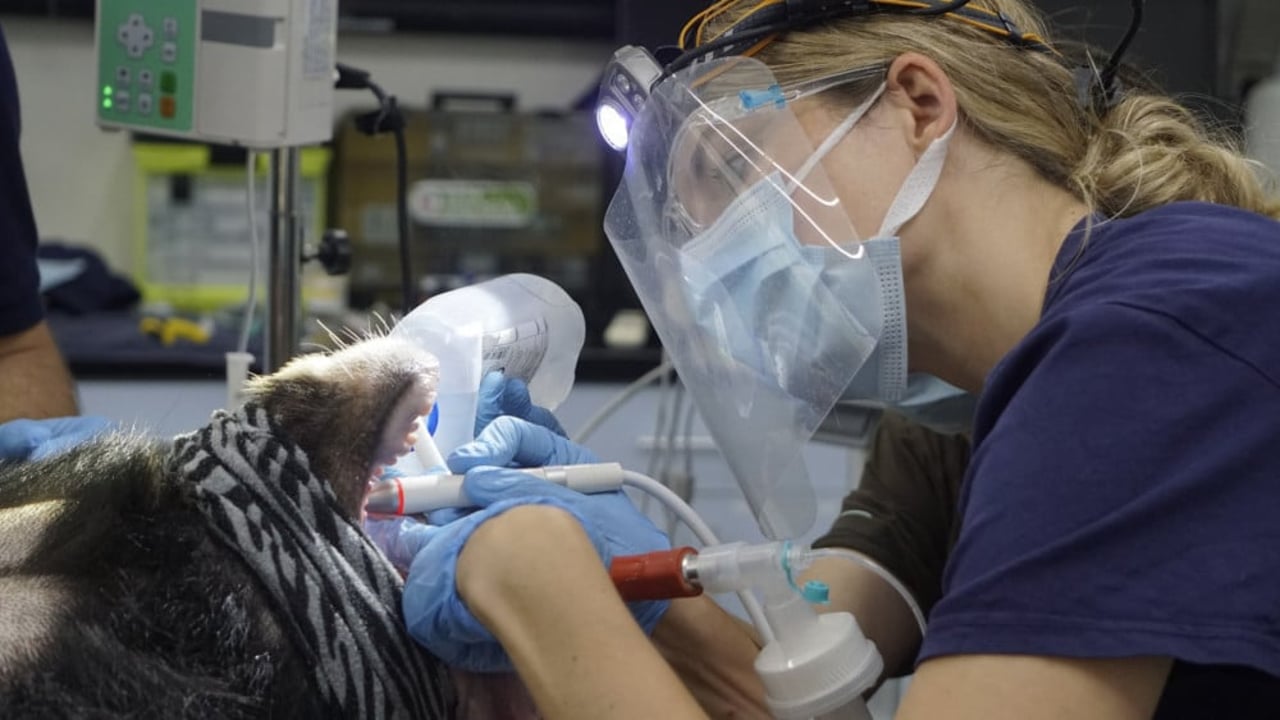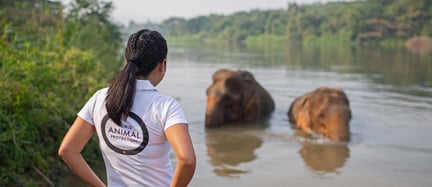
Asiatic black bear finally rescued after twenty years in captivity
News
Thank you for supporting the monitoring programme to help end the illegal bear bile trade in Vietnam. FOUR PAWS successfully transferred Na, a female Asiatic black bear whose name translates to ‘custard apple’. This was after she was voluntarily surrendered by the farmer of a bile farm you helped monitor, together with Vietnam’s Forest Protection Department, since 2019.
Image credit: World Animal Protection / One Touch Connections
Na spent two decades of her life on a Vietnamese bile farm in Ho Chi Minh City province. On this farm, she was forced to live in severely substandard captive conditions.
Thanks to your tireless support for our extensive bile farm monitoring programme and our partners’ efforts, the farmer was successfully persuaded to surrender Na to FOUR PAWS bear sanctuary in Ninh Bin last month.
Na will now finally live a life where she has proper veterinary care, space to roam and forage, bathe in the sun, and play in a semi-wild environment along with 45 other Asiatic black bears. A life worth living.
Phuong Le Duy, Vietnam Consultant, World Animal Protection, said:
We are delighted that Na will be given a chance to live a life free from cruelty. She was kept in cruel conditions for over 20 years, unable to see light, fresh air or simply roam around in the wild where she belongs. We will continue to work tirelessly with our partners to support the release of more bears and give them a better life.
The FOUR PAWS bear sanctuary ensures every rescued bear lives the highest quality of life with their dedicated team of professionals looking after their every little need. The sanctuary stands as a beacon of hope for more bears like Na.
Image credit: World Animal Protection / One Touch Connections
Barbara van Genne, Director of the Wild Animals Department, FOUR PAWS, said:
Our team has been working tirelessly during the last months to make the rescue of Na happen, and we are glad that she is finally in our care. She was calm during the transfer and is doing well. She suffers from multiple severe health issues commonly seen in bile bears, such as chronic osteoarthritis, dental, liver and heart disease. Moreover, Na will have to have surgery for suspected glaucoma in one of her eyes. Our experienced team at BEAR SANCTUARY Ninh Binh will now provide her with all the care she needs. Na’s story is a reminder that bears are still suffering on bear farms in Vietnam. Help often comes too late as many die alone and in pain. The Vietnamese authorities must swiftly close all remaining bear farms to give as many bears as possible a second chance at a better life.
Image credit: World Animal Protection / One Touch Connections
While it’s a happy ending for Na, unfortunately, five of her fellow bears lost their lives before they could be rescued. But with your help and our partners’ ongoing efforts, we will work to ensure that help can reach bears suffering in captivity before it’s too late.
Together, we can make this the last generation of bears to suffer in the barbaric bear bile trade.
Ending bear bile farming
The Government of Vietnam outlawed bear bile farming in 2005. At that time 4,300 bears were held on farms. All had to be microchipped and registered, to prevent new bears entering the farms, and it became illegal to extract their bile. However, it is still legal to keep bears on farms and illegal bear bile production continues behind closed doors.
Since 2006, in collaboration with authorities and our local partner, Education for Nature (ENV), World Animal Protection has been providing equipment and training for microchipping bears in Vietnam, introducing new cutting-edge microchipping technology in 2015, and working on an extensive monitoring programme of farms, which continues to this day thanks to your support.
Thanks to this monitoring, bears that are identified without a microchip and/or registration papers, deeming them illegal, are confiscated. They are then moved by authorities to government rescue centres or by organisations like Four Paws and Free the Bears to one of their sanctuaries.
The monitoring programme has been integral in moving Vietnam to end bear bile farming, and today there are more bears in sanctuaries and rescue centres than on farms. Our aim is to ensure the Vietnam government closes all bear farms and transfers any remaining bears to sanctuaries and rescues centres by 2025, so that no more bears suffer in captivity.
Wild animals used for traditional medicine
Every year, thousands of animals are bred in captivity or snatched from the wild to be brutally killed for their body parts.
Support us
Your support is key to bringing an end to animal suffering across the world and here in Aotearoa New Zealand



